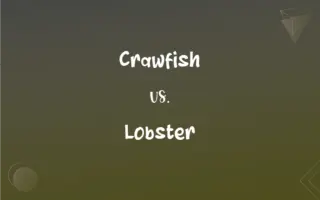Edibleness vs. Edibility: What's the Difference?
Edited by Aimie Carlson || By Janet White || Published on January 23, 2024
Edibleness refers to the quality of being edible or fit to eat. Edibility denotes the suitability or safety of a substance for consumption.

Key Differences
Edibleness emphasizes the basic quality of being fit for consumption, without necessarily implying safety or nutritional value. Edibility, however, often includes considerations of safety and nutritional adequacy for consumption.
The term edibleness is used to describe the inherent characteristic of a substance that can be eaten. In contrast, edibility typically refers to the broader suitability of food for eating, including aspects like safety and healthiness.
Edibleness is a more general term, simply indicating that something is not inedible. Edibility, on the other hand, often carries connotations of being suitable for consumption based on specific criteria like taste, safety, or nutritional content.
In culinary contexts, edibleness might refer to the basic ability to be eaten without harm. Edibility, however, is a more comprehensive term, encompassing factors such as palatability, nutritional value, and absence of harmful substances.
Edibleness indicates the mere possibility of a substance being consumed, while edibility implies a more evaluative judgment about the fitness of the substance for human consumption.
ADVERTISEMENT
Comparison Chart
Focus
Basic quality of being edible
Suitability and safety for consumption
Implications
Indicates something can be eaten
Suggests suitability based on taste, safety, nutrition
Use in Context
General, about possibility of eating
Comprehensive, including various factors
Common Usage
More general and simple
More specific and evaluative
Associated Criteria
Merely edible or not
Palatable, nutritious, and safe
ADVERTISEMENT
Edibleness and Edibility Definitions
Edibleness
Suitability of food for basic consumption.
The edibleness of the food was adequate for survival.
Edibility
Quality of being good and safe to eat.
Nutritional analysis enhances our understanding of a food's edibility.
Edibleness
Quality of being fit to eat.
The edibleness of the berries was questionable.
Edibility
A measure of food's safety and nutritional value.
The edibility of wild plants varies greatly.
Edibleness
Being edible as opposed to inedible.
The plant's edibleness is still under study.
Edibility
Suitability of being safe and fit for eating.
The edibility of the mushrooms was confirmed by tests.
Edibleness
Capability of being eaten without harm.
We assessed the edibleness of the foraged mushrooms.
Edibility
Assessment of food for human consumption.
Chefs consider the edibility of ingredients for gourmet dishes.
Edibleness
A characteristic of being consumable.
The edibleness of the fruits was evident.
Edibility
Evaluating food for consumption based on specific standards.
Food critics often debate the edibility of exotic cuisines.
Edibleness
Fit to be eaten, especially by humans
Edible roots.
An edible mushroom.
Edibility
Fit to be eaten, especially by humans
Edible roots.
An edible mushroom.
Edibleness
Something fit to be eaten; food
Edibles such as vegetables and meat.
Edibility
Something fit to be eaten; food
Edibles such as vegetables and meat.
Edibleness
Edibility
Edibility
Suitability for use as food
Edibleness
Suitableness for being eaten.
Edibility
Suitableness for being eaten; edibleness.
Edibleness
The property of being fit to eat
Edibility
The property of being fit to eat
FAQs
What is the definition of 'edibleness'?
Edibleness refers to the quality of being fit for consumption by humans.
How is 'edibility' defined?
Edibility means the suitability of something to be eaten without harmful effects.
Can 'edibleness' be used in scientific contexts?
Yes, but 'edibility' is more commonly used in scientific literature.
Can we use 'edibleness' in formal writing?
It's not incorrect, but 'edibility' is preferred in formal contexts.
Can 'edibleness' have different meanings in different cultures?
The basic meaning remains the same, but what is considered edible can vary culturally.
Is 'edibleness' commonly used in English?
No, 'edibleness' is less common than 'edibility'.
Which industries most frequently use the term 'edibility'?
Food industry, nutrition, and gastronomy often use the term 'edibility'.
Is 'edibility' a noun?
Yes, 'edibility' is a noun.
Are 'edibleness' and 'edibility' interchangeable?
Yes, they are generally interchangeable in context relating to the suitability of something for eating.
Do 'edibleness' and 'edibility' have the same etymology?
Both originate from Latin, but through different paths; 'edibility' is more directly derived.
Are there antonyms for 'edibility'?
"Inedibility" or "toxicity" are often used as antonyms.
Is there any context where 'edibleness' is more appropriate than 'edibility'?
No specific context favors 'edibleness'; usage depends on personal preference.
Can 'edibility' refer to taste?
Indirectly, though it primarily concerns safety rather than flavor.
Are there any specific phrases that use 'edibleness'?
Not particularly; it's used in straightforward contexts regarding food safety.
How is 'edibility' used in culinary contexts?
It's used to discuss whether ingredients are safe and appropriate for use in cooking.
What is a synonym for 'edibility'?
"Palatability" or "consumability" can be synonyms, though they carry slightly different connotations.
Can 'edibleness' be used as an adjective?
No, it's always a noun. The adjective form would be "edible."
What is the plural form of 'edibility'?
It remains 'edibility'; it doesn't have a plural form.
How do we use 'edibility' in a sentence?
Example: "The edibility of these mushrooms is questionable."
How do you pronounce 'edibleness'?
It's pronounced as /ˈed.ɪ.bəl.nəs/.
About Author
Written by
Janet WhiteJanet White has been an esteemed writer and blogger for Difference Wiki. Holding a Master's degree in Science and Medical Journalism from the prestigious Boston University, she has consistently demonstrated her expertise and passion for her field. When she's not immersed in her work, Janet relishes her time exercising, delving into a good book, and cherishing moments with friends and family.
Edited by
Aimie CarlsonAimie Carlson, holding a master's degree in English literature, is a fervent English language enthusiast. She lends her writing talents to Difference Wiki, a prominent website that specializes in comparisons, offering readers insightful analyses that both captivate and inform.






































































